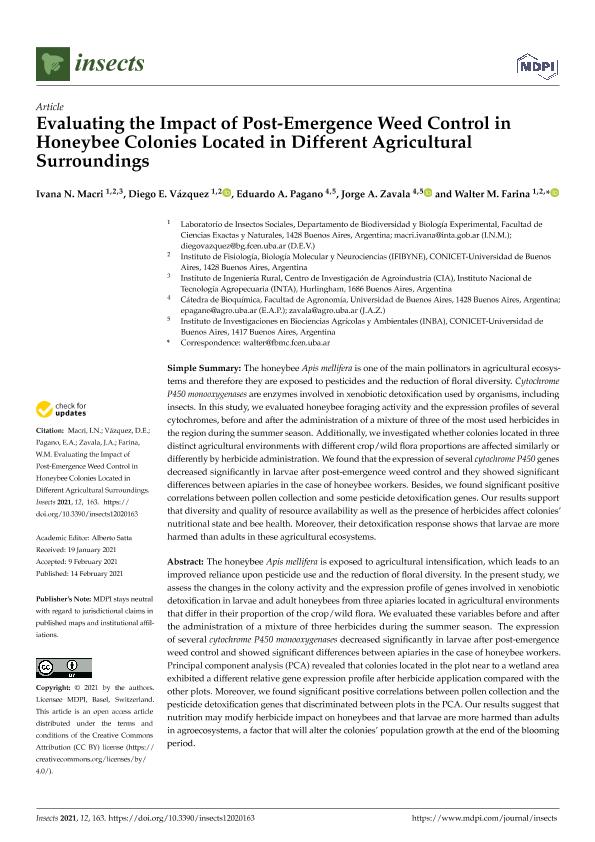Artículo
Evaluating the impact of post-emergence weed control in honeybee colonies located in different agricultural surroundings
Macri, Ivana Noelia ; Vázquez, Diego Eduardo
; Vázquez, Diego Eduardo ; Pagano, Eduardo Antonio; Zavala, Jorge Alberto
; Pagano, Eduardo Antonio; Zavala, Jorge Alberto ; Farina, Walter Marcelo
; Farina, Walter Marcelo
 ; Vázquez, Diego Eduardo
; Vázquez, Diego Eduardo ; Pagano, Eduardo Antonio; Zavala, Jorge Alberto
; Pagano, Eduardo Antonio; Zavala, Jorge Alberto ; Farina, Walter Marcelo
; Farina, Walter Marcelo
Fecha de publicación:
02/2021
Editorial:
Multidisciplinary Digital Publishing Institute
Revista:
Insects
e-ISSN:
2075-4450
Idioma:
Inglés
Tipo de recurso:
Artículo publicado
Clasificación temática:
Resumen
The honeybee Apis mellifera is exposed to agricultural intensification, which leads to an improved reliance upon pesticide use and the reduction of floral diversity. In the present study, we assess the changes in the colony activity and the expression profile of genes involved in xenobiotic detoxification in larvae and adult honeybees from three apiaries located in agricultural environments that differ in their proportion of the crop/wild flora. We evaluated these variables before and after the administration of a mixture of three herbicides during the summer season. The expression of several cytochrome P450 monooxygenases decreased significantly in larvae after post-emergence weed control and showed significant differences between apiaries in the case of honeybee workers. Principal component analysis (PCA) revealed that colonies located in the plot near to a wetland area exhibited a different relative gene expression profile after herbicide application compared with the other plots. Moreover, we found significant positive correlations between pollen collection and the pesticide detoxification genes that discriminated between plots in the PCA. Our results suggest that nutrition may modify herbicide impact on honeybees and that larvae are more harmed than adults in agroecosystems, a factor that will alter the colonies’ population growth at the end of the blooming period.
Archivos asociados
Licencia
Identificadores
Colecciones
Articulos(INBA)
Articulos de INST.DE INVEST. EN BIOCIENCIAS AGRICOLAS Y AMBIENTALES
Articulos de INST.DE INVEST. EN BIOCIENCIAS AGRICOLAS Y AMBIENTALES
Citación
Macri, Ivana Noelia; Vázquez, Diego Eduardo; Pagano, Eduardo Antonio; Zavala, Jorge Alberto; Farina, Walter Marcelo; Evaluating the impact of post-emergence weed control in honeybee colonies located in different agricultural surroundings; Multidisciplinary Digital Publishing Institute; Insects; 12; 2; 2-2021; 1-18
Compartir
Altmétricas



